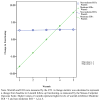Predicting the longitudinal effects of the family environment on prodromal symptoms and functioning in patients at-risk for psychosis
- PMID: 20171848
- PMCID: PMC2856759
- DOI: 10.1016/j.schres.2010.01.017
Predicting the longitudinal effects of the family environment on prodromal symptoms and functioning in patients at-risk for psychosis
Abstract
The current study examined the relationship between the family environment and symptoms and functioning over time in a group of adolescents and young adults at clinical high risk for psychosis (N=63). The current study compared the ability of interview-based versus self-report ratings of the family environment to predict the severity of prodromal symptoms and functioning over time. The family environmental factors were measured by interviewer ratings of the Camberwell Family Interview (CFI), self-report questionnaires surveying the patient's perceptions of criticism and warmth, and parent reported perceptions of their own level of criticism and warmth. Patients living in a critical family environment, as measured by the CFI at baseline, exhibited significantly worse positive symptoms at a 6-month follow-up, relative to patients living in a low-key family environment. In terms of protective effects, warmth and an optimal level of family involvement interacted such that the two jointly predicted improved functioning at the 6-month follow-up. Overall, both interview-based and self-report ratings of the family environment were predictive of symptoms and functioning at follow-up; however patient's self-report ratings of criticism had stronger predictive power. These results suggest that the family environment should be a specific target of treatment for individuals at risk for psychosis.
Copyright (c) 2010 Elsevier B.V. All rights reserved.
Figures
Similar articles
-
Positive family environment predicts improvement in symptoms and social functioning among adolescents at imminent risk for onset of psychosis.Schizophr Res. 2006 Jan 31;81(2-3):269-75. doi: 10.1016/j.schres.2005.10.005. Epub 2005 Nov 23. Schizophr Res. 2006. PMID: 16309893
-
Parent attitudes and parent adolescent interaction in families of youth at risk for psychosis and with recent-onset psychotic symptoms.Early Interv Psychiatry. 2008 Nov;2(4):268-76. doi: 10.1111/j.1751-7893.2008.00088.x. Early Interv Psychiatry. 2008. PMID: 21352160
-
Perceptions of family criticism and warmth and their link to symptom expression in racially/ethnically diverse adolescents and young adults at clinical high risk for psychosis.Early Interv Psychiatry. 2015 Dec;9(6):476-86. doi: 10.1111/eip.12131. Epub 2014 Feb 27. Early Interv Psychiatry. 2015. PMID: 24576106 Free PMC article.
-
North American Prodrome Longitudinal Study (NAPLS 2): The Prodromal Symptoms.J Nerv Ment Dis. 2015 May;203(5):328-35. doi: 10.1097/NMD.0000000000000290. J Nerv Ment Dis. 2015. PMID: 25919383 Free PMC article.
-
Adolescents and young adults at ultrahigh risk of psychosis: detection, prediction and treatment. A review of current knowledge.Psychiatr Danub. 2011 Sep;23 Suppl 1:S118-22. Psychiatr Danub. 2011. PMID: 21894117 Review.
Cited by
-
An Interpersonal CBT Framework for Involving Relatives in Interventions for Psychosis: Evidence Base and Clinical Implications.Cognit Ther Res. 2016;40:198-215. doi: 10.1007/s10608-015-9731-3. Epub 2015 Dec 11. Cognit Ther Res. 2016. PMID: 27069287 Free PMC article.
-
Youth-caregiver agreement on clinical high-risk symptoms of psychosis.J Abnorm Child Psychol. 2014 May;42(4):649-58. doi: 10.1007/s10802-013-9809-x. J Abnorm Child Psychol. 2014. PMID: 24092494 Free PMC article.
-
Perceived criticism predicts outcome of psychotherapy for panic disorder: Replication and extension.J Consult Clin Psychol. 2017 Jan;85(1):37-44. doi: 10.1037/ccp0000161. J Consult Clin Psychol. 2017. PMID: 28045286 Free PMC article.
-
Affective and neural reactivity to criticism in individuals high and low on perceived criticism.PLoS One. 2012;7(9):e44412. doi: 10.1371/journal.pone.0044412. Epub 2012 Sep 11. PLoS One. 2012. PMID: 22984504 Free PMC article.
-
Family-focused therapy for individuals at high clinical risk for psychosis: A confirmatory efficacy trial.Early Interv Psychiatry. 2022 Jun;16(6):632-642. doi: 10.1111/eip.13208. Epub 2021 Aug 23. Early Interv Psychiatry. 2022. PMID: 34427047 Free PMC article. Clinical Trial.
References
-
- Butzlaff RL, Hooley JM. Expressed emotion and psychiatric relapse. Arch Gen Psychiatry. 1998;55(6):547–552. - PubMed
-
- Hooley JM. Expressed emotion and relapse of psychopathology. Annu Rev Clin Psychol. 2007;3:329–352. - PubMed
-
- Hooley JM, Richters JE. Expressed emotion: A developmental perspective. In: Cicchetti D, Toth SL, editors. Emotion, cognition, and representation. University of Rochester Press; Rochester, NY, US: 1995. pp. 136–166.
-
- Hooley JM, Teasdale JD. Predictors of relapse in unipolar depressives: Expressed emotion, marital distress, and perceived criticism. J Abnorm Psychol. 1989;98:229–235. - PubMed
Publication types
MeSH terms
Grants and funding
LinkOut - more resources
Full Text Sources
Medical
Miscellaneous


